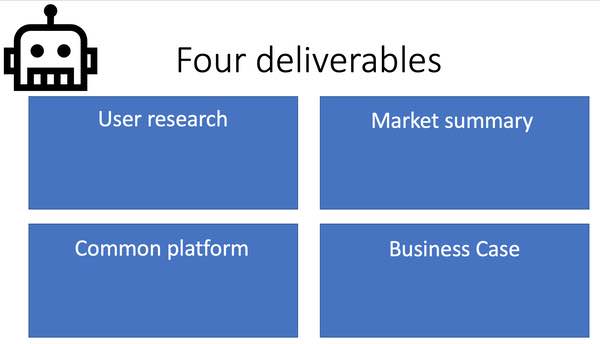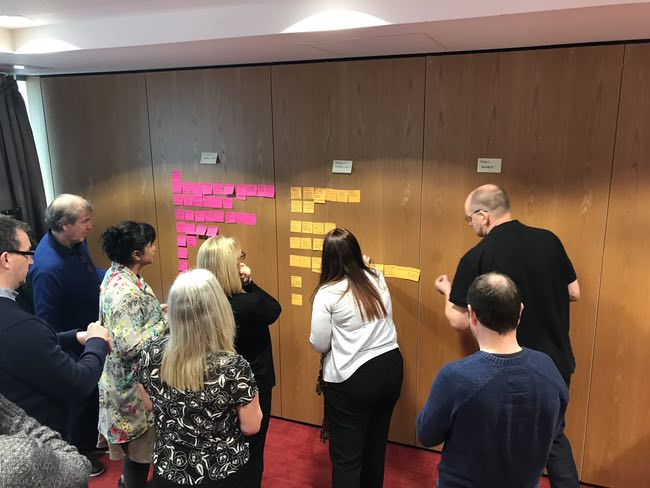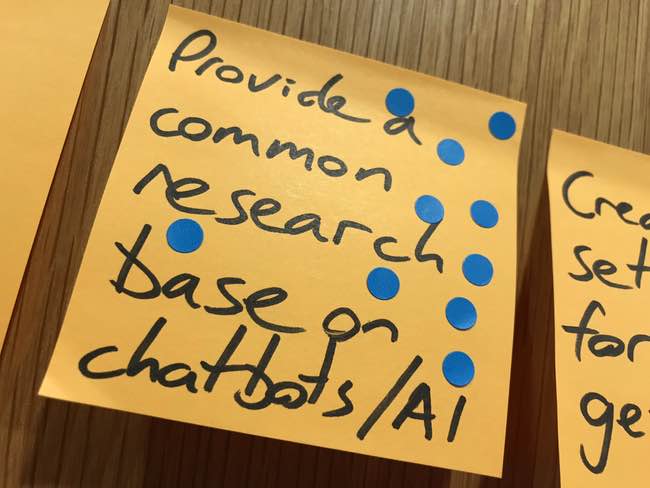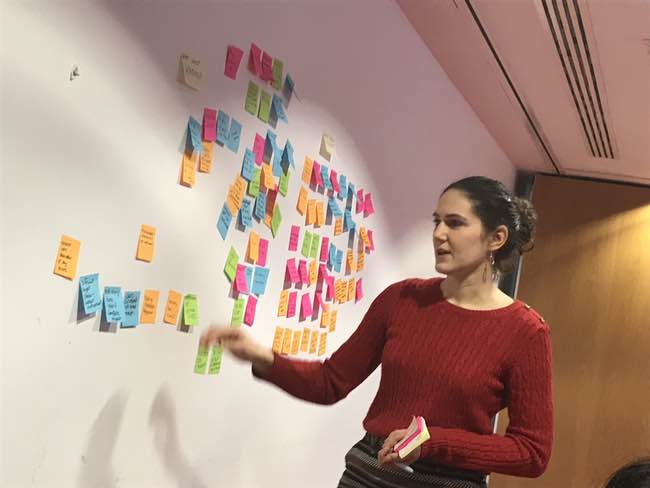Project Kick-Off Day
It’s felt like an age in arriving, but finally the Chatbot project has launched properly. With contracts exchanged and our delivery partners engaged it was time to all get together in Birmingham for an all-day kick-off event.
The objectives of the event were to ensure that everyone had a common understanding of the project, what was required from all participants (and when) and how it would run.
Amazingly, this was the first time that (nearly) everyone involved in the project had met in person. Having said that, we had to use a conference phone to dial in two councils to get a full representation. Sometimes the phone worked too!
Setting the scene
Neil Lawrence from Oxford City Council gave an introduction to the project, and the long journey taken to get to this event, starting with the Expressions of Interest stage back in September through the contract signing on 15 February.

It was a good opportunity to remind everyone what the project was looking to deliver and why, including the ethos behind the project - ‘giving something back’ to the sector to re-use rather than just re-inventing the wheel.
Key questions looking to be resolved are;
- Can we use chatbots and AI to solve service delivery problems?
- How do we focus on user needs?
- Is there a robust business case for using this technology?
- How do we get started?
It also focused on what members of the project team had said about how they wanted the project team to work together, what its culture would feel like, what individuals’ hopes and fears were and what user research was available already.
Download the chatbots kickoff intro presentation
Getting a set of common objectives
Tom Williamson from Torchbox led us all in a set of Post It exercises to help us all understand where we were each coming from as organisations and as a project.
We were asked to identify;
- Council objectives that could be applied to the project
- Objectives that each council had for the project as a whole
- Any metrics we’d use to measure success (or ‘magic numbers’)

After each exercise, everyone was allowed two votes to use on any of the Post-It’s that best captured what everyone felt

It was great to see where our thinking coincided and what we all felt was important.
Ensuring we captured the ‘votes from Norway’ (little Eurovision reference for you there) from our dial-in attendees was fun too!
User research aims
Luiza Frederico from Torchbox talked us through how the user research would be organised and what it would aim to cover.
The aims are;
- To understand the user experience of customer support in each research area (motivations, triggers, frequency, success and pain points)
- Mental models and terminology used during communication, search and navigation
- User experience of, and attitude towards, digital channels and technology (ex. social, channels, chatbots)
From our project objectives exercise it was clear that the councils involved all want to see great user research carried out, and also to gain skills in this area to use in future projects.
Torchbox will be enabling this through;
- Two training days (split geographically) to get all involved up to speed with good practice in user research. Each council will be able to send up to two attendees
- Carrying out the user research at one council site for each of the research areas.
- Producing materials to help guide other councils in carrying out their own research
- Pooling all the research output for each research area to gain a good base of information on user views, and identifying any regional differences
Download the Torchbox event slides
User research timetable
Research will be carried out in four week-long sprints, one for each research area;
- w/c 11 March 2019 - Planning
- w/c 18 March 2019 - Waste & Recycling
- w/c 25 March 2019 - Revenues & Benefits
- w/c 1 April 2019 - Highways
Each week will involve;
- Two days for interviews and analysis
- One day for analysis and synthesis
- Reporting back in a sprint Stand-up
We quickly identified a potential issue with the Revenues & Benefits research, in that this time of year is the busiest for these staff involved in ‘end of year’ work. This was something to feed back to MGCLG about project timing in Q4 for local authorities.
We also had a discussion about the use of incentives for users to get involved. Torchbox’s guideline is £1 per minute (so about £60 per attendee). Usefully the project has funds available to cover this, but at least one council thought that they had local constraints on this. We also talked about the logistics of how this could be procured and distributed to participating councils. One area still to resolve.
Stakeholder research
Tom also took us through the other side of user research in plans to interview key stakeholders.
This will involve three nominated stakeholders from each council, with Torchbox undertaking the interviews themselves. The timing will be concurrent with user research for the four research areas to arrive at a combined understanding of each area by the end of each sprint.
Pre-mortem exercises
Sophie Ramm from Torchbox led us in identifying project risk and success factors in two Post-It exercises taken from and end-of-project perspective looking back;
- What went wrong with the project?
- What went right with the project?

This got our pessimistic and optimistic juices flowing (although ‘Brexit’ came up in both exercises!), so lots of suggestions were made
When distilled into the key factors we could see the risks were around;
- Commitment/engagement/buy-in, both internal and external
- Time
- Politics beyond our control
- How we work together as a project
- Consistency in our work
The success factors identified were;
- Communication and participation (internally consistent across councils)
- Commitment
- Agreed ways of working
Next Steps
With time very tight to deliver the project we are moving into full-on planning and preparation for the user research phase. A long list of actions was drawn up to get us all engaged and starting work.
It’s getting real!